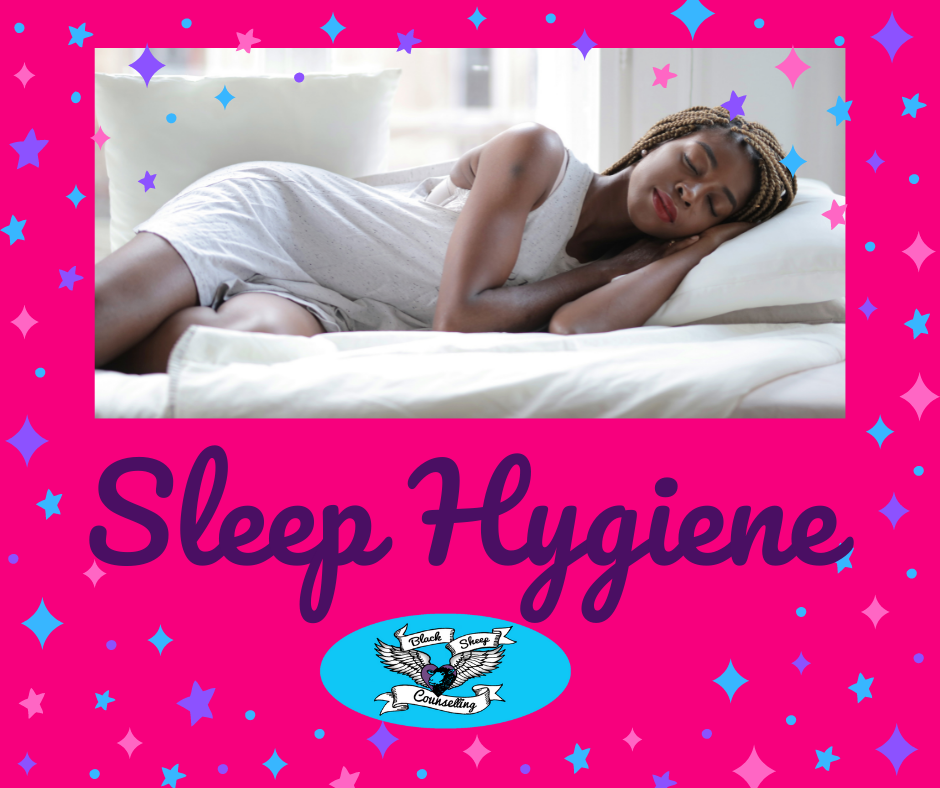Sleep Hygiene

Have you ever heard someone diminish the importance of sleep with a quip such as “I’ll sleep when I am dead”?
While the occasional night without optimal sleep is going to happen, chronic inadequate sleep poses real health concerns.
Sleep in incredibly important to our overall health. Just like our cell phones need their batteries charged in order to function, our bodies need time for rest and repair. During sleep our cells regenerate. Sleep helps promote digestion and elimination, builds muscles, and our neurocircuitry gets a chance to stop negative feedback looping (rumination). Sleep also helps restore the damage that the sympathetic nervous system does to the body*.
Research on sleep deprivation shows increased risk of anxiety, depression, cardiovascular disease, cancer, obesity, neurological conditions such as dementia/Alzheimer’s, as well as self-reported poor relationships with others. People over the age of 45 who sleep for less than six hours per night are 200% more likely to suffer a stroke or heart attack than those who sleep longer.
How to Increase Sleep Hygiene
Interestingly, the parasympathetic nervous system is naturally active at night (specifically between 10:00 PM-2:00 AM), while the sympathetic nervous system is naturally active during the day. Aiming to sleep during the naturally occurring state of activation of the parasympathetic system is congruent with the body’s needs. Habitual bedtimes conditions the body to enter the parasympathetic state. Having a consistent bedtime will increase quality of sleep.
Substances such as alcohol and caffeine impede the most important stage in our sleep cycle – rapid eye movement (REM)**. To help promote REM sleep, try to limit alcohol consumption to 3 hours before retiring to bed and limit caffeine to before noon.
The blue light emitted from smartphones iPads, and computers inhibit optimal sleep if you are exposed to it at night. Try to turn off devices a few hours before bedtime and limit the hours spent in front of the TV prior to sleep. If reducing blue light activity during the evenings is not possible, try considering the use of amber-tinted glasses when using electronics.
Consider some soothing wind down activities such as meditation***, reading, listening to music, cuddling with a pet or your kiddos, getting a massage from your partner, using a calming essential oil in a diffuser, or having a warm bath/shower.

* the sympathetic nervous system (includes the “fight or flight” mechanism) is responsible for some big-time wear-and-tear of our bodies: muscle breakdown (catabolic), the release of muscle-destroying and fat storing hormones, as well as stress chemicals like cortisol & adrenaline, it increases heart rate, blood pressure, causes blood vessels to dilate, and decreases digestion & sexual function.
**FAST FACTS ABOUT REM:
During REM sleep our brain is almost as active as it is when we are awake and we burn more calories than we would if we were watching TV
In the REM phase of sleep breathing becomes fast and irregular
REM sleep is thought to help consolidate memories
During REM sleep, the eyes move rapidly in various directions
People enter REM sleep within the first 90 minutes of falling asleep
As the sleep cycle repeats throughout the night, REM sleep repeats. REM sleep accounts for about 20-25% of an adult’s sleep
***Meditations for sleep: 20 of the Best Guided Meditations for Sleep and Insomnia (lifehack.org)
References:
Banich, M. T., & Compton, R. J. (2017). Cognitive neuroscience (4th ed.). Belmont, CA: Wadsworth, Cengage Learning.
Mate, G. (2011). When the body says no: Understanding the stress-disease connection. Hoboken, NJ: John Wiley & Sons, Inc.
Porges, S. W. (2017). The pocket guide to polyvagal theory: The transformative power of feeling safe (1st ed.). New York, NY: W. W. Norton & Company, Inc.
van der Kolk, B. A. (2014). The body keeps the score: Brain, mind, and body in the healing of trauma. New York, NY: Penguin Books.
Walker, M. (2018). Why We Sleep: The New Science of Sleep and Dream, Penguin.
